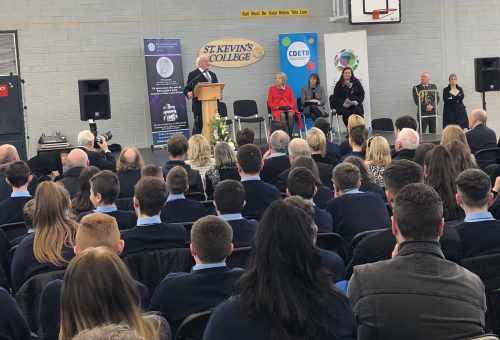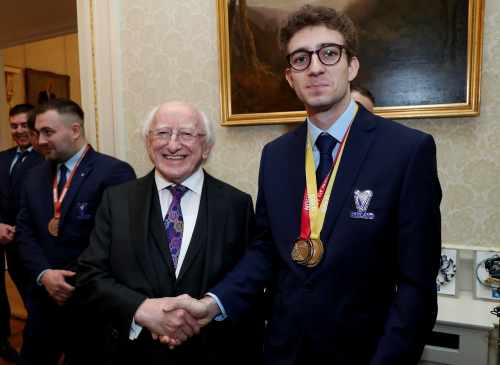Speech marking International Day to End Violence against Women
Áras an Uachtaráin, Wednesday, 27th November, 2019
A chairde,
May I first of all say that I am standing in for Sabina who is attending a family funeral for a relative of her brother. I, however, am delighted to have the opportunity of welcoming you, and especially at a very important time as far as women’s health is concerned.
I am very pleased to host a reception this morning in Áras an Uachtaráin to welcome the International Women’s Club of Dublin on the week that we mark the International Day for the Elimination of Violence against Women.
This occasion provides a valuable opportunity to reflect on the current state of affairs as regards the critical matters of gender equality, women’s rights and participation, and specifically the issue of violence against women and girls.
The pursuit of equality for all citizens has been a central focus of Sabina’s and my public life. We are both, however, acutely aware that it is a struggle that cannot be overcome as long as there continue to be thousands of women, and indeed many men, who live lives as victims of unprovoked violence, indeed often finding themselves trapped in cruel relationships, relationships they may have entered into with so much joy and hope for the future.
Violence against women and girls is one of the most widespread, persistent and devastating human rights violations in our world today. Kofi Annan, then Secretary-General of the United Nations, declared in a 2006 report published by the United Nations Development Fund for Women:
“Violence against women and girls is a problem of pandemic proportions. At least one out of every three women around the world has been beaten, coerced into sex, or otherwise abused in her lifetime with the abuser usually someone known to her.”
Violence and abuse impoverishes lives. It is often inflicted by those to whom victims are intimately related or connected, thus making their homes not the places of safety and security they should be, but spaces defined by angst, fear and uncertainty. Internationally, violence has become a weapon of war, with rape of women and men reported in several recent accounts, such as that which occurred in Sudan in June this year.
Violence is not inherent in the human being. It is learned, copied, imitated, and absorbed in an insidious acculturation process. Such violence is often now, correctly, considered a form of hate crime, committed against women or girls specifically because they are female, and can take many forms.
Violence against women, and gender-based violence more generally, may have a long documented history, and the incidents and intensity of such violence has varied over time, but we are not now moving towards its elimination. Such violence is in too many member states of the U.N. allowed to prevail as a mechanism for the subjugation of women, whether in society in general or in an interpersonal relationship. Such violence may be sourced in ignorance and even at times invoked as a tradition or part of a culture. It is simply and always an abuse of rights, sense of entitlement, superiority, misogyny or similar attitudes in the perpetrator, or because of a violent nature, especially against women. There can never be any cultural rationalisation for gender violence.
The 1993 UN Declaration on the Elimination of Violence against Women was the first major international document that highlighted the recognition of violence against women as a human rights violation and resulted from the collective effort of a global feminist movement to transform the Vienna conference from a general and mainstream human rights conference into a conference on women’s rights. The Declaration states:
“violence against women is a manifestation of historically unequal power relations between men and women” and “violence against women is one of the crucial social mechanisms by which women are forced into a subordinate position compared with men”.
Women’s rights are one of the great ethical challenges of our time. The international community has failed women and by failing women failed humanity, and this is why it is so important that these have had to feature so prominently in the work of the United Nations, including the 2030 Agenda for Sustainable Development.
As part of the 2030 Agenda, the UN Sustainable Development Goals are the blueprint to achieve a better and more sustainable future for all, a moment of global solidarity and empathy. They address the international contemporary challenges we face, including those related to poverty, inequality, climate, environmental degradation, prosperity, peace and justice. The Goals interconnect and, in order to leave no one behind, it is crucial that we achieve each Goal and target by 2030.
Goal Number 5, signed up to by 193 nations of the UN and which came into effect in January 2016, calls on all the nations of the world to, I quote:
“Achieve gender equality and empower all women and girls.”
Gender equality is not only a fundamental human right, but a necessary foundation for a peaceful, prosperous and sustainable world. Achieving gender equality will require enforceable legislation that promotes empowerment of all women and girls and requires secondary education for all girls.
The targets contained within the 2030 Agenda call for an end to gender discrimination and for empowering women and girls. The assertion is that the Goals can deliver transformative change for girls only if girls are consulted. Their priorities and needs must be taken into account. Girls should be viewed not as beneficiaries of change, but as agents of change. Engaging women and girls in the implementation of the Sustainable Development Goals is therefore crucial.
Over two decades on from the World Conference on Women in Beijing, and the subsequent Committee on the Elimination of Discrimination Against Women, world leaders have, through the 2030 Agenda, decisively re-affirmed their commitment to achieving gender equality and to the empowerment of all women and girls.
This agenda, about which Sabina and I feel passionately, is firmly grounded in human rights instruments, such as the Convention on the Elimination of All Forms of Discrimination against Women, and is rightly and necessarily ambitious, universal and transformative in nature.
Despite the adoption of this Convention, violence against women and girls remains a pervasive problem worldwide. In a 2014 study entitled, “Violence against women: an EU-wide survey”, the European Union’s Fundamental Rights Agency reported that one-in-seven women in Ireland have experienced physical violence by a partner since the age of 15, and that more than one-third of women have experienced psychological violence.
Shockingly, some 50,000 women a year are killed by their partners, according to a global study on gender-related killing of women and girls released in November 2018 by the United Nations Office on Drugs and Crime.
We must therefore continue to raise public awareness about the issue, as well as increase both policymaking and resources dedicated to ending violence against women and girls worldwide. Yet, there is still a long way to go at the global scale.
To date, many countries have yet to outlaw domestic violence, while 37 countries worldwide still exempt rape perpetrators from prosecution if they are married to, or eventually marry, the victim, while 49 countries currently have no laws protecting women from domestic violence.
In 2017, the EU and UN launched the Spotlight Initiative, which aims to eliminate all forms of violence against women and girls by raising the awareness of this issue. I welcome and support those leaders of faith systems who have issued explicit condemnation of gender violence, and in particular recent condemnations of female genital manipulation.
There has, I know, been a steady increase in the number of women helped by various organisations dedicated to the promotion of women’s rights. This underlines the prevalence of gender-based abuse in our society and the many people, including children, who regularly experience or witness brutality and aggression in their own homes. It also, however, indicates that violence inside the home is, however late, now progressively getting the levels of public recognition it deserves, encouraging increasing numbers of victims to seek assistance, and to make the decision to no longer suffer quietly behind closed doors.
At a time when women’s rights are under increasing threat from the rise of the Right and from extremist groups who seek to enslave rather than empower women, there is a compelling need to renew the collective commitment made in Beijing over 20 years ago, to condemn such violence whenever and wherever it occurs, and to consider more deeply what remains to be done if we are to achieve even the most basic of women’s rights.
Let us be clear: we cannot achieve the Sustainable Development Goals if we do not achieve gender equality. If we do not enable the true empowerment of women and girls worldwide, our declarations will be shown to have been hollow rhetoric. It is disappointing that after so many UN appeals, that the outrage of gender violence is continuing, that opposition to its elimination is growing in certain parts. Indeed, it could be argued that we have regressed on the issue of violence against women. What is to be our response to the fact that 50 women per week in the European Union are murdered by partners or ex-partners? We must therefore change, gather momentum in our change, so that we can realise tangible results in this area.
Domestic violence is an outright negation of the dignity and the rights of its victims. There is no cultural defence acceptable for it in any form or tradition. We are speaking about the vindication of a basic right. Our collective journey towards true democracy, towards an Ireland defined by equality and a spirit of shared humanity, will never be complete if those abuses of the gravest sort are tolerated, or if they are ignored or evaded, if silence is allowed to prevail around them.
Let us all commit to vindication of what has been agreed at the U.N., call out nations’ and institutions who covertly or overtly make violence acceptable, walk in solidarity with those in our society who suffer from emotional and physical abuse, and do all we can to raise awareness of this most important issue. You are most welcome this morning to the Áras, and I wish you all the very best in your future endeavours.
Go raibh míle maith agaibh go léir.


